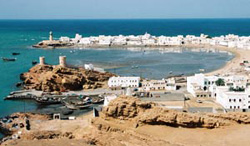Arabia, the Gulf, & the GCC Blog
The “Arabia, the Gulf, and the GCC” blog features insights and analysis from the National Council on U.S.-Arab Relations as well as information about the Council’s programs, projects, events, and activities. Founded in 1983, the National Council is a non-profit, non-governmental, educational organization dedicated to improving American awareness, knowledge, and understanding of the Arab region.
Gulf in the News – January 8, 2014
Gulf states focus on green energy Source: Al-Monitor (Read full story) The International Renewable Energy Agency (IRENA) announced that the
Gulf in the News – January 7, 2014
Saudi Arabia, France make their move in Lebanon Source: Al-Monitor (Read full story) The Saudi decision to give $3 billion in aid to
Gulf in the News – January 6, 2014
Saudi-US ties ‘critical to cement political transitions in Mideast’ Source: Arab News (Read full story) Custodian of the Two Holy
Gulf in the News – January 3, 2014
Tests prove held man is top Saudi militant linked with Iran embassy attack in Beirut Source: The National (Read full
Gulf in the News – January 2, 2014
It is forbidden to use phones while driving, says mufti Source: Arab News (Read full story) It is forbidden to
Gulf in the News – December 20, 2013
Nuclear energy’s benefits becoming more obvious, says UAE Source: The National (Read full story) Nuclear energy will account for carbon

NCUSAR’s Summer 2014 Washington, DC Internship Program – Applications Due February 28
Special Opportunity for Students: The National Council Fellowships: Washington, DC Summer Internship Program June 2 – August 8,
Gulf in the News – December 19, 2013
Saudi envoy: West’s policies on Syria and Iran dangerous gamble Source: Arab News (Read full story) Saudi Arabia is prepared

Eighteenth Annual Oman Cultural Immersion Program — February 19 – March 5, 2014
Applications Now Being Accepted for the National Council on U.S.-Arab Relations’ Eighteenth Annual Oman Cultural Immersion Program February
Gulf in the News – December 18, 2013
Kuwait Parliament Speaker praises deeply-rooted Gulf-EU relations Source: Kuwait News Agency (Read full story) Kuwait’s National Assembly (Parliament) Speaker Marzouq
Gulf in the News – December 17, 2013
Saudi Arabia will go it alone Source: New York Times (Read full story) Saudi Arabia has been friends with our
Gulf in the News – December 16, 2013
Saudi Prince Criticizes Obama Administration, Citing Indecision in Mideast Source: New York Times (Read full story) “We’ve seen several red
